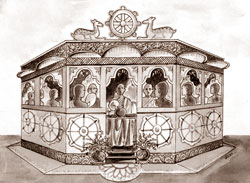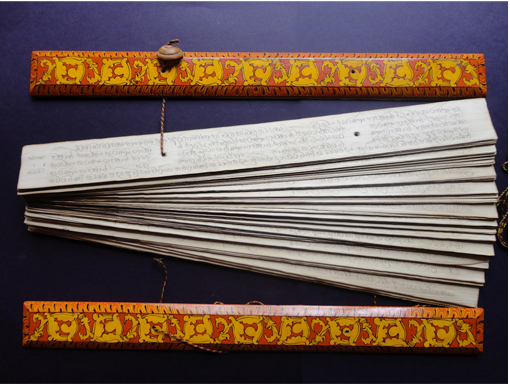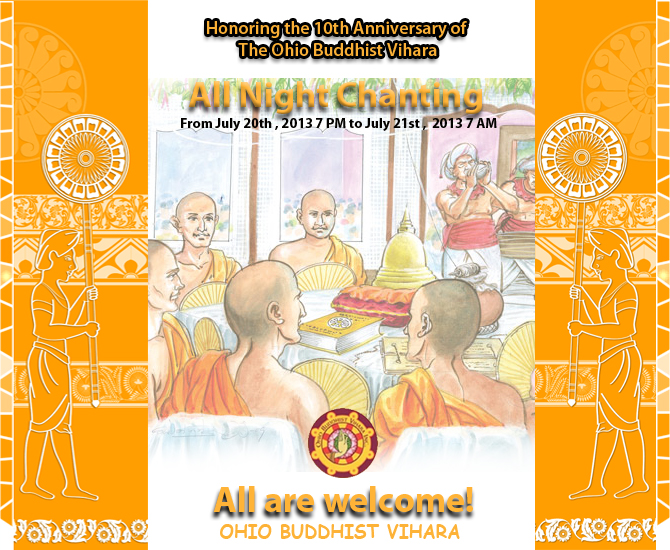|

Paritta (Protection)
Paritta in Pali, paritrana in Sanskrit and pirit (pronounced pirith) in Sinhala means principally “protection”. Paritta suttas refer to certain suttas or discourses delivered by the Buddha. Reciting or listening to them is believed to afford protection by averting illness or danger, warding off the influence of malignant beings, obtaining protection and deliverance from evil, and promoting health, prosperity, and well-being.
When pirith is recited it produces mental well-being particularly in those who listen with saddha (confidence in the truth of the Buddha's words). Such mental well-being can help those who are ill to recover; it can also help to induce the mental attitude that brings happiness – and overcomes its opposite sadness.
Among the factors that combine to contribute to efficacy of paritta recitals are 1) Paritta recital is a form of saccakiriya, i.e., an asseveration of truth. Protection results from the power of such asseveration. This means establishing oneself in the power of truth to gain one's ends. 2) Several discourses of the Book of Protection describe the virtuous life. Virtue protects the virtuous, and so a person who listens to the recital of paritta suttas intelligently will acquire a state of mind so virtuous as to enable him to dominate all evil influences and be protected from all harm. 3) Reciters of the paritta are expected to do so with a heart of loving-friendliness (metta) and compassion, wishing the listeners and others well-being and happiness and protection from all harm. Loving-friendliness (metta) is an active force. Every act by one who truly practices metta is done with a pure mind to help, to cheer and to make the paths of others easier, smoother and better adapted to the conquest of sorrow, the winning of the Highest Bliss.
The sacred book of Catubhanavara Pali
(The Book of Protection)
This collection of paritta discourses — in Sinhala, The Pirit Potha — is the most widely known Pali book in Sri Lanka. It is called The Buddhist ‘Bible’; it is given an important place in the Buddhist home and is treated with great veneration. In most houses where there is a small shrine, this book is kept there so that the residents may refer to it during their devotional hour. The book contains a collection of twenty four suttas or discourses, almost all delivered by the Buddha himself and found scattered throughout the five original collections (nikayas), which form the Sutta Pitaka or "Canonical Discourses." It is also known as Catubhanavara (in Sinhala Satara Banavara).

|
Paritta Ceremony
On special occasions, monks are invited to recite the Paritta Suttas not for short periods, but over one whole night, or for three or seven days, and sometimes even for weeks. On such occasions a pavilion (Pirit Mandapaya) is constructed for the purpose of accommodating the monks during the recital.
So long as the recital continues, there will be found a pot of water (Pirit pan) placed on a table before the monks. On this table there is also a sacred thread (Pirit Nula). For an all-night Pirit ceremony, the casket containing a relic of the Buddha, and the Pirit Potha or The Book of Protection written on ola leaves, are also brought into the pavilion. The relic represents the Buddha, the Pirit Potha represents the Dhamma or the teachings of the Buddha, and the reciting Bhikkhu-Sangha represent the Ariya-Sangha, the Arahant disciples of the Buddha, thus completing the triple gem.
The thread is drawn round the interior of the pavilion, and its end twisted round the casket, the neck of the pot of water, and tied to the cord of the ola-leaf book. While the special discourses are being recited the monks hold the thread. The purpose is to maintain an unbroken communication from the water to the relic, to the Pirit Potha and to the officiating monks (Buddha, Dhamma, Sangha, the Tri-ratana, the triple gem.) A ball of thread connected to 'The Three Jewels' and the water is unloosened and passed on to the listeners (seated on the ground on mats), who hold the thread while the recital goes on.
When the recital in Pali of the entire book is over at dawn, the thread sanctified by the recital is divided into pieces and distributed among the devotees to be tied round their wrists or necks. At the same time the sanctified water is sprinkled on all, who even drink a little of it and sprinkle it on their heads. These are to be regarded as tangible symbols of the protective power of the Paritta that was just recited. It is a service to induce blessings, and has positive psychological benefits as well.
The Procedure
The chapter of monks enters the Mandapaya and they take their seats, followed by the sequence of events given below.
- Aradhana 1: Invitation to chant the paritta by a layman who offers a sheaf of betel to the monks.
- Anusasana: Advisory speech to the listeners in the language of the listeners by an elder monk.
- Pancasila: Namaskara, Saranagamana, and Pancasila administered by an elder monk to the lay devotees.
- Aradhana 2: Traditional invitation to the monks by all devotees.
- Devaradhana: Invocation to the devas (deities) by an older monk.
- Beginning of the group chanting (Maha pirith): Two monks lead the chanting, and other monks follow. The Monks, generally about twelve or fourteen, then recite three popular Suttas: Maha-mangala Sutta (Discourse on Blessings), Ratana Sutta (The Jewel Discourse), and Karaniya Metta Sutta (Discourse on Loving-friendliness). Thereafter a pair of monks (Yuga) recite the remaining Suttas for two hours. They then retire, to be followed by another pair for two more hours reciting twenty three suttas. Four monks recite the first part of the Atanatiya sutta, followed by another four monks for second part of Atanatiya Sutta thus completing the recital at dawn.
- The Paritta ceremony is usually followed by offering of the morning meal (dana) to the monks.
|

